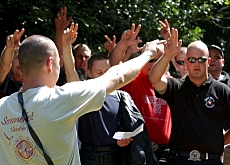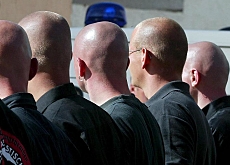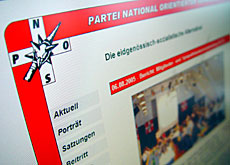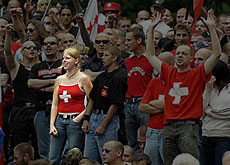Swiss forced to re-evaluate extremist threat

The Swiss authorities are under fire for not taking far-right extremism seriously enough following a spate of high-profile incidents.
The public appearance of 800 Nazi skinheads on August 1 during National Day celebrations on the Rütli, the traditional birthplace of Switzerland, turned a spotlight on the issue and triggered a national debate.
Then in September 400 neo-Nazis participated in an unauthorised concert in Valais in honour of Ian Stuart, founder of the extremist organisation Blood and Honour, at which Jews were derided and Hitler venerated. The police did not intervene.
An outcry ensued a few weeks later when young extremists were discovered handing out music CDs with far-right lyrics in school playgrounds.
Perceived by some as adolescent rebellion, the incidents are seen by others as extremely worrisome.
A prominent member of the rightwing Swiss People’s Party dismissed the heckling skinheads at the National Day celebrations as “fools, playing at being Nazis”.
For his part, Swiss Justice Minister Christoph Blocher said that the far-left militants who disrupted his own National Day speech had presented a greater danger than the neo-Nazis on the Rütli.
Unequivocal stance
But Marcel Niggli, professor of criminal law at Fribourg University, argues that not taking far-right extremism seriously is a mistake.
“There are people in this country, also in politics, who believe that racism is not indicative of other problems. Others, thankfully still the majority, believe that racism is a problem that endangers democracy,” he told swissinfo.
Anti-racism legislation has had a certain deterrent value, says Niggli.
“You see it just by looking at the numbers of convictions, and above all, you see it in the fact that opponents on the right have been fighting very intensively against the statute for ten years. That means it’s bothering them.”
Niggli believes that the problem of rightwing extremism will grow in the absence of a clear and unequivocal stance against it.
Referring to the concert in Valais, he observed: “When neo-Nazis can act up right in front of the police, that shows that parts of the justice system are not ready to implement the anti-racism law.”
Defending themselves, the Valais police complained that the section of the justice ministry responsible for identifying, following, and hindering violent extremism had not notified them in a timely manner of the neo-Nazi concert, making it impossible to safely intervene.
Focus on left
According to Niggli, indications point to reports on internal security in Switzerland giving far greater weight to the dangers faced from the far left, whereas in Germany just the opposite holds true.
“Rightwing extremist crimes occur five times more frequently [in Germany] than leftwing extremist crimes. And in German-speaking Switzerland, at least, it should not be substantially different.”
Further complicating the issue of dealing with extremists of all stripes is the fact that in Switzerland police and prosecutors are organised at the cantonal level.
“Depending on the canton, the authorities are to a greater or lesser extent interested in either the right or the left,” explained Niggli.
In the wake of the unauthorised neo-Nazi gathering, the Valais police chief has proposed forming a special intercantonal police unit that could be tasked with intervening in such situations.
Timetable:
August 2005, about 800 far-right extremists marched on the Rütli and heckled the Swiss president during his National Day speech.
September 2005, around 400 neo-Nazis participate in an unauthorised concert, deriding Jews and praising Hitler.
September 2005, the SonntagsZeitung newspaper publishes a story on a rightwing extremist in the Swiss army.
September 2005, young extremists discovered giving out music CDs with far-right lyrics to schoolchildren in canton Aargau.
(Adapted from German by Kathleen Peters)

In compliance with the JTI standards
More: SWI swissinfo.ch certified by the Journalism Trust Initiative



You can find an overview of ongoing debates with our journalists here . Please join us!
If you want to start a conversation about a topic raised in this article or want to report factual errors, email us at english@swissinfo.ch.